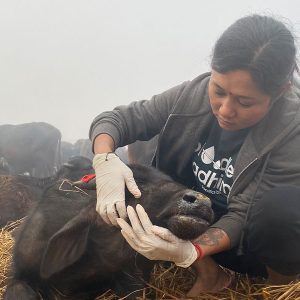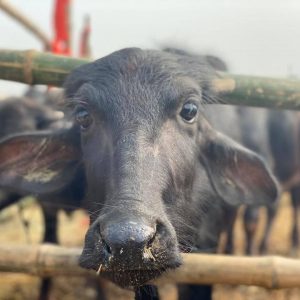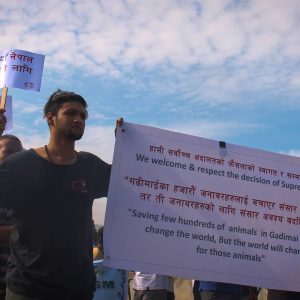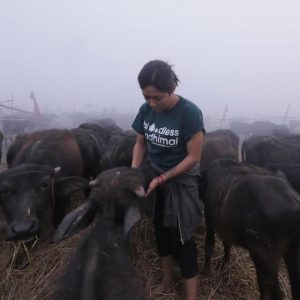Our initiative – Bloodless Gadhimai Campaign
The Gadhimai festival is a longstanding tradition held every five years at the Gadhimai Temple in southern Nepal, in Bara District. The Gadhimai Temple is located in Bara District, Gadhimai Municipality. It lies about 200 kilometers south of Kathmandu and 7 kilometers east of the district’s headquarters in Kalaiya. The largest number of animal sacrifices in the world is performed in the Gadhimai Mela. The Gadhimai Mela(Fair) is believed to have started around 500-600 years ago during the Sena period. Thousands of people from the country and abroad come to the fair to offer animal sacrifices. There has been a popular belief that Goddess Gadhimai fulfills all wishes when animal sacrifices are offered in the temple. Thousands of animals such as Buffaloes, Pigeons, White Mouse, Pigs, Goats and Chickens are sacrificed. The establishment of Gadhimai Mela has an interesting history.
At Sneha’s Care, we believe all living creatures deserve compassion and respect. Sneha’s Care has been a part of the Federation of Animal Welfare Nepal (FAWN). FAWN being an umbrella organization for the animal welfare organizations working in Nepal has emerged as a powerful voice for change. Sneha Shrestha, the founder of Sneha’s Care has been designated to the position of Chairperson of FAWN leading this dedicated animal welfare organization, a tireless advocate for animal welfare. FAWN recognizes the cultural importance of the festival but firmly believes that traditions can evolve without inflicting suffering on animals. That’s why we have been strongly standing alongside the Federation of Animal Welfare Nepal (FAWN). In our collective fight to end the sacrifice of innocent animals during the Gadhimai festival. The association has been conducting a campaign to stop the mass animal sacrifice of Gadhimai every year. It has been named as “Bloodless Gadhimai” Campaign.
The tireless efforts have yielded significant results. In 2019, the number of animal sacrifices at Gadhimai saw a dramatic decrease, demonstrating the power of dedicated advocacy. In that particular year, the number of sacrificed buffaloes plummeted from an estimated 20,000 in previous festivals to 5,500. This dramatic shift is a direct result of FAWN’s dedication under Sneha Shrestha’s leadership and the growing public sentiment against animal cruelty. Our advocacy extends beyond mere reduction. We envision a future Gadhimai festival devoid of animal sacrifice altogether. We promote alternative offerings such as coconuts, sweets, and red-colored cloths, ash gourd, betel nuts demonstrating that reverence and gratitude can be expressed through symbolic gestures that do not harm any living being. We believe that celebrating cultural heritage and respecting religious beliefs can coexist with compassion for all creatures.
We have also seen the need for a Stronger Animal Welfare Act, While Nepal has various legal provisions related to animal welfare scattered across different historical periods, there’s a critical lack of a comprehensive Animal Welfare Act. This lack of a unified framework weakens enforcement and allows animal cruelty to persist. Existing laws, such as the Civil Code of Conduct 2074, do mention preventing cruelty towards animals and restrictions on public animal killings. However, stronger implementation and stricter enforcement are necessary to truly protect animals. Sneha’s Care stands with FAWN to urge the Nepal government to prioritize a robust Animal Welfare Act. The Supreme Court of Nepal has issued directives discouraging the practice of animal sacrifice. This underscores the growing national sentiment towards animal welfare. The supreme court has directed the responsible government bodies to establish committees as per need for elimination of harmful practices against animals according to the Article 27 of Animal Care and Animal Services Act, 2055.
The upcoming 2024 Gadhimai festival presents an opportunity to embrace a more mindful and cruelty-free celebration. Sneha’s along with FAWN are working super hard this year in supporting this transformation and advocating for a future where tradition and compassion go hand in hand. The theme this year will be ‘Bloodless Gadhimai.’ We believe no animal’s life should be taken in the name of faith. We advocate for alternative offerings, such as kuvindo (Ashgourd) and coconuts, that show respect for tradition while upholding our values of compassion.
Here’s how you can help:
Please visit our facebook page https://www.facebook.com/bloodlessgadhimai . Share information about the “Bloodless Gadhimai” campaign and the importance of animal welfare. By working together, we can ensure a future where the Gadhimai festival celebrates tradition without sacrificing innocent lives.







